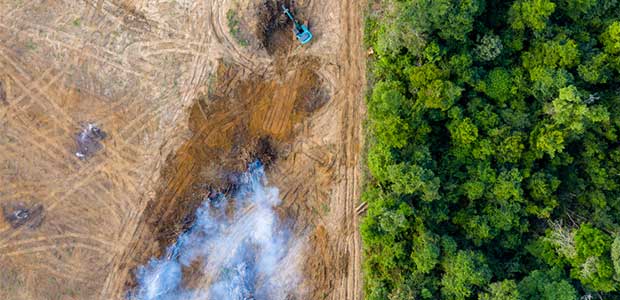
World Rainforest Day: Retailers Commit to Deforestation-free Supply Chains
Every year, June 22 is recognized as World Rainforest Day: a day committed to raising awareness about our world’s largest source of oxygen—and one of the Earth’s most important types of ecosystems. This year, 45 major businesses decided to recognize it together by reevaluating their supply chains.
- By Amanda Smiley
- Jun 22, 2020
The Lungs of the Earth
It is probably not new news to you that rainforests are particularly vulnerable to deforestation and species loss for a number of reasons. There is so much discussion about protecting rainforests because, frankly, they are incredibly important to keeping our planet healthy.
Rainforests make up about two percent of the world’s surface area but play a major role in the Earth’s ecosystems and life forms (humans included). Rainforests are called carbon sinks—they store and absorb the carbon dioxide in the air and circulate more than 20 percent of the world’s oxygen (aka, they help us breathe and are called “the lungs of the Earth”). Over half of all the animal and plant species on the planet are found in rainforests, as well as a fifth of the world’s freshwater sources.
Unfortunately, the rainforests are in danger. At the current rate of deforestation, 28,000 species are expected to go extinct by 2050, explains the Rainforest Partnership. With recent social distancing guidelines put in place from the pandemic, deforestation is believed to be getting worse than usual since authorities tasked with patrolling areas have had to reduce their schedules.
World Rainforest Day was first observed on June 22, 2017. It was established by a collaboration of groups, called the Rainforest Partnership. The international non-profit organization is based in Austin, Texas and is dedicated to protecting and regenerating tropical rainforests through community-based projects in the Amazon. Now, every year, World Rainforest Day is dedicated to raising awareness about rainforests and their important purpose.
Fashion is Forestry
In this interconnected world, it is no secret that our actions—and the actions of our companies and governments—play a major part in what happens to ecosystems and communities alike. Since trees (and other resources in rainforests) are vital to many supply chains, a company’s opportunity to make sustainable and responsible choices is crucial.
You may have heard the phrase “fashion is forestry.” What does that mean? Well, there are so many materials needed to make clothes and fashion products (like soy, palm oil and beef)—which are all primarily sourced from rainforests.
Fashion does bear a significant forest footprint, explains one article from Edie.net. In fact, 150 million trees are logged for use as textiles every year, mainly for use as viscose. The use of recycled viscose is in its infancy, with 6.5 million tonnes of virgin viscose produced and 26 million tonnes of viscose landfilled annually. Moreover, the use of viscose has repeatedly been linked to water and land pollution.
Retailers are Stepping Up
This year, 45 major businesses jointly pledged to eliminate deforestation from their fashion supply chains, as part of a collaborative initiative coordinated by non-profit Canopy. Brands like Ralph Lauren, Ted Baker, Sainsbury and Asda are among those who pledged.
Canopy’s CanopyStyle and Pack4Good initiatives “empower brands to remove the use of forestry products from ancient and endangered forests from their fashion and packaging supply chains respectively,” explains the article.
Luckily, these 45 are not the only ones who have joined the initiative. These new additions make the CanopyStyle Initiative inclusive of 259 businesses in total—including brands like Levi Strauss, Stella McCartney, Marks & Spencer and H&M.
Businesses, Investors and Consumers Come Together
Canopy began collaborating with businesses last year to “map all of the world’s ancient and endangered forests, the suppliers which are using products from these regions, and the end-user businesses sourcing from these suppliers,” explains the Edie.net article. The goal? To provide shared information among businesses, investors and consumers on where corporate resources and materials were coming from.
M&S is one of the most advanced groups a part of this initiative, and it launched a digital map late last year that highlights all textile supplies through which it sources man-man cellulosic fibres (MMCF) including viscose.
Other groups have addressed the environmental impact of MMCF as well. For example, Textile Exchange and Forum for the Future recently launched a new vision for transforming global MMCF supply chains in the coming decade, where net-positive benefits could be delivered for people and the environment.
The vision also set out a number of recommended actions for businesses and other industry players. They include ways industry players can impact regenerative agriculture, decarbonization, the circular economy, pollution mitigation, upholding rights and creating prosperity.
What Can You Do?
Saving the rainforests might seem like a daunting task. However, there are so many choices you can make—on individual, corporate, community and government levels—that will make a difference.
Of course, for starters, the fashion industry has both the power and the impact to readdress the ways in which is contributing to deforestation. So, if you work in the industry, support the industry or just buy clothes ever—there is something to be done.
WorldRainforestDay.org lists the following steps you can take today to do your part in saving the rainforests:
- Learn about the rainforest. Educate yourself!
- Donate to rainforest protectors
- Eat more plants and less meat. This can be as easy as meatless Mondays.
- Shop for rainforest-friendly products.
- Travel sustainably.
- Hold leaders and corporations accountable.
- Spread the word.
- Host a safe, socially-distant event.
World Rainforest Day is just as much about raising awareness as it is encouraging action. The first step is educating yourself, and the second is leading by example.
About the Author
Amanda Smiley is the Content Editor for Occupational Health Magazine and Environmental Protection for 1105 Media. You can reach her at [email protected].